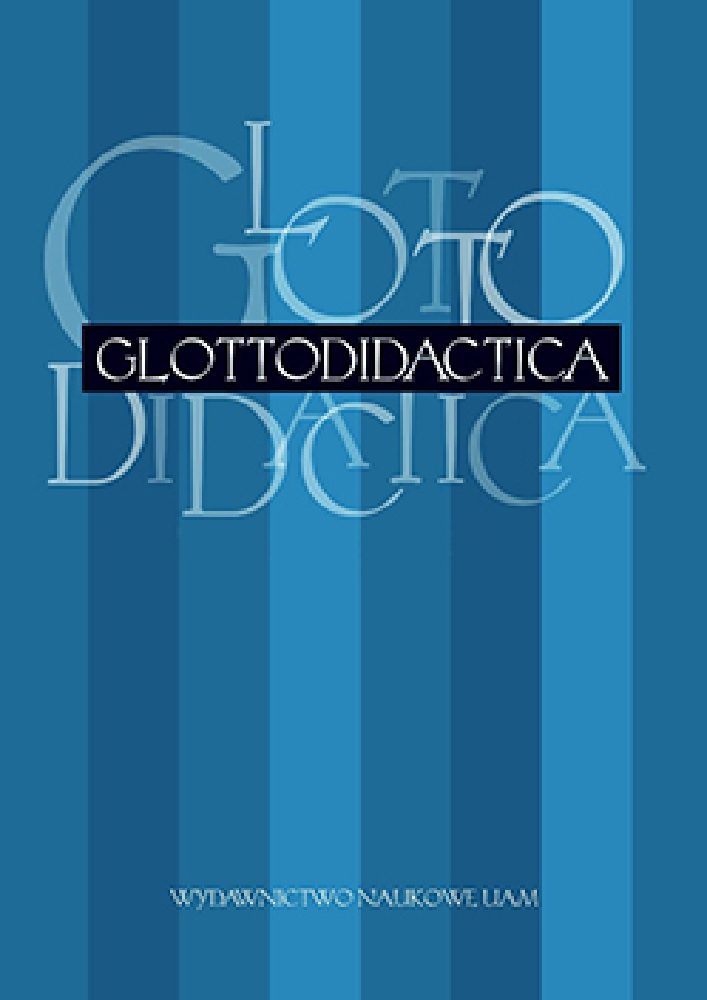Abstract
The subject of this discussion consists of selected concepts regarding the codematic foundations of foreign-language learning and cybernetic systems of foreign-language communication. The author focuses on processes of controlling, regulating, and directing foreign-language structures at the inter-individual level from the teacher to the learner. The control process, coupled with the process of basic information transfer, supports and strengthens it, both with linguistic (suprasegmental) means and extra-linguistic (visual) means. The basis of the regulation process are the effects of the coded structures of the learner, effects delivered to the teacher by the control system functioning through feedback. Glottodidactic direction includes the above two processes in order to transfer inaccurate structures, once corrected by the teacher, with the aim of re-decoding them and correctly assimilating them.
References
Burkart, R. (1983). Kommunikationswissenschaft. Wien / Köln: Böhlau Verlag.
Klaus, G. / Liebscher, H. (1974). Systeme, Informationen, Strategien. Eine Einführung in die kybernetischen Grundgedanken der System- und Regelungstheorie, Informationstheorie und Spieltheorie. Berlin: VEB Verlag Technik.
Lerner, A. Ja. (1970). Grundzüge der Kybernetik. Braunschweig: Vieweg Verlag.
Maser, S. (1971). Grundlagen der allgemeinen Kommunikationstheorie. Stuttgart u.a.: Verlag W. Kohlhammer.
Sachsse, H. (1974). Einführung in die Kybernetik unter besonderer Berücksichtigung von technischen und biologischen Wirkungsgefügen. Braunschweig: Verlag Vieweg.
Schaefer, G. (1972). Kybernetik und Biologie. Stuttgart: J.B. Metzlersche Verlagsbuchhandlung.
Schnabl, H. (1972). Sprache und Gehirn – Elemente der Kommunikation. Zu einem kybernetischen Modell der menschlichen Nachrichtenverarbeitung. München: Wilhelm Goldmann Verlag.
Schröder, H. (1975). Kommunikation und Information im Unterricht. KG München: Franz Ehrenwirth Verlag.
Szczodrowski, M. (2001). Steuerung fremdsprachlicher Kommunikation. Gdańsk: Wydawnictwo Uniwersytetu Gdańskiego.
Szczodrowski, M. (2007). Zur Struktur und Funktion des fremdsprachlichen Rückkopplungsgefüges. In: K. Grzywka / J. Godlewicz-Adamiec / M. Grabowska / M. Kosacka / R. Małecki (Hrsg.), Kultura – Literatura – Język. Festschrift für Herrn Professor Lech Kolago zum 65. Geburtstag (S. 828–836). Warszawa: Instytut Germanistyki Uniwersytetu Warszawskiego.
Zabrocki, L. (1966). Kodematische Grundlagen der Theorie des Fremdsprachenunterrichts. Glottodidactica. An International Journal of Applied Linguistics, I, 3–42.
Zabrocki, L. (1975). Kybernetische Modelle der sprachlichen Kommunikation. Wrocław / Warszawa / Kraków / Gdańsk: Zakład Narodowy im. Ossolińskich / Wydawnictwo Polskiej Akademii Nauk / Komitet Neofilologiczny.
License
 This work is licensed under a Creative Commons Attribution-NoDerivatives 4.0 International License.
This work is licensed under a Creative Commons Attribution-NoDerivatives 4.0 International License.
Authors
Authors of texts accepted for publication in Glottodidactica are required to complete, sign and return to the Editorial team’s office the Agreement for granting a royalty-free license to works with a commitment to grant a CC sub-license.
Under the agreement, the authors of the texts published in Glottodidactica grant Adam Mickiewicz University in Poznań a non-exclusive, royalty-free license and authorize the use of Attribution-NoDerivatives 4.0 International (CC BY-ND 4.0) Creative Commons sub-license.
The authors retain the right to the free disposal of the work.
Users
Interested Internet users are entitled to use works that have been published in Glottodidactica since 2016, under the following conditions:
▪ attribution – obligation to provide, together with the distributed work, information about the authorship, title, source (link to the original work, DOI) and the license itself.
▪ no derivatives – the work must be preserved in its original form. Without the author's consent, it is not possible to distribute the modified work in the form of translations, publications, etc.
Copyrights are reserved for all texts published before 2016.
Miscellaneous
Adam Mickiewicz University in Poznań retains the property right as a whole (layout, graphic form, title, cover design, logo etc.).
Privacy statement
The names and email addresses published on this journal site will be used exclusively for the purposes declared by this journal and cannot be used for any other purpose or by any other party.





